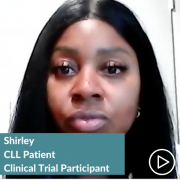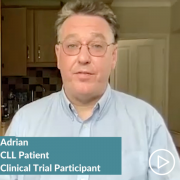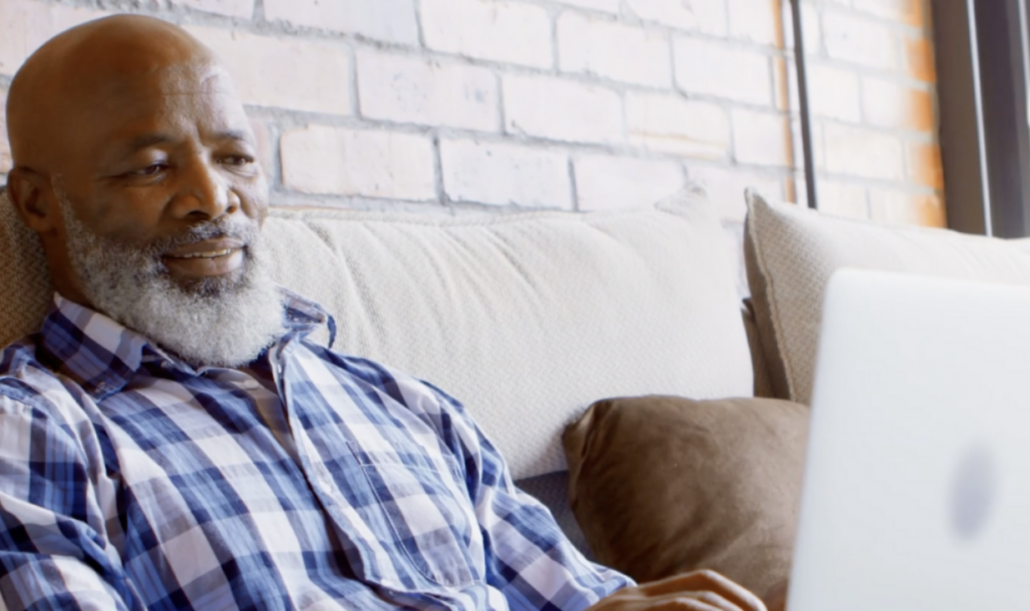CLL Programs
For more resources and support related to Chronic Lymphocytic Leukemia (CLL), please visit our main health center page.
Click here for Chronic Lymphocytic Leukemia (CLL).
Chronic Lymphocytic Leukemia: Adrian’s Clinical Trial Profile
Chronic Lymphocytic Leukemia: Adrian’s Clinical Trial Profile from Patient Empowerment Network on Vimeo.
Chronic lymphocytic leukemia (CLL) patient Adrian’s diagnosis came as a shock when he’d been feeling healthy. Watch as he shares about his unique patient journey – as a former physician and past experience supporting clinical trials – about the value clinical trials can provide in making treatment decisions and access to treatments for improved patient outcomes.
See More from Patient-to-Patient Diverse CLL Clinical Trial Profiles
Related Programs:
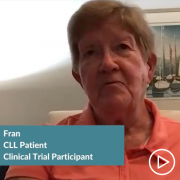
|
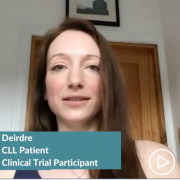
|
Transcript:
Adrian:
Hi, I’m Adrian., I’m 50 years old. And in 2017, When I was 46, I was diagnosed with chronic lymphocytic leukemia (CLL). It happened as a bit of a shock to me, actually. I’ve been quite healthy quite well earlier that week, I’d gone walking in the mountains in Switzerland, but I collapsed one day on the way home from work, and was diagnosed with pneumonia. And during that illness, they realized that my immune system wasn’t working too well, and then my lymphocyte count was high, and I was diagnosed with CLL. I was put on watch and wait, which for some people can last a decade or more, but for me, it only lasted 15 months.
As a doctor, I obviously know a fair bit about the clinical research, and so I did a bit of research on my own. It was going to be difficult for me to get one of the selective treatments outside of a trial. So I wasn’t really sure what to do, and I became quite pressured and quite stressed about how to make this decision, and it might sound odd, but it felt like a bit of a relief almost to allow a computer to make the choice for me. Obviously, it’s a bit weird getting to the point where you realize, actually, a doctor doesn’t know what’s best for you, you don’t know what’s best for you, and your research doesn’t give you a clear answer, but to me that’s the ideal time for a trial because then you don’t know if you know what’s best for you, then you probably ought to go down that road, but if you’re uncertain and you think, well, any of these three treatments that were on offer to me through the trial would be good, they all work, they went to slightly different side effect profiles, and it was hard to know which would work best for me as an individual.
So, I quite like the idea that in a way, as an individual, one of these treatments would be better for me, and it might not be the same one that would be better for another patient, and so even with the data, we wouldn’t know for sure which of the best treatment was for me. Well, at least this way, it’s a computer making the decision randomly for me, so I’ve got an equal chance of getting whatever is the right treatment for me. But the other major thing, of course, to me was the idea or giving something back, and I guess this is where my professional background did make the difference, because I’d spent more than a decade working in clinical research myself and encouraging other doctors and helping other doctors who are running these trials and helping to supervise them, helping to run the trials and design the trials, and so I figured that as I obviously benefited in the community, benefited from so many other people who had gone before and put themselves forward for these trials, so there was a altruistic part of me that wanted to give back.
None of these drugs would be available to us now if other people hadn’t taken the risks, if you like, and taken on board these clinical treatments and sometimes actually by taking on a treatment a bit earlier than you might otherwise have been able to get it. You might actually gain a benefit, and I’ve certainly got friends who took treatments that are now considered old school, but when they took them, say 20 years ago, they were very much new school, and if they have to take and then they would probably have died.
The treatment itself worked really well, and I was actually randomized to the old-fashioned treatment. It’s well known what the side effects are and what you’re dealing with. I did get quite unwell at the beginning and I probably would have that happened no matter what treatment I had. You kind of get used to being in the hospital, and they know what to do, and they know how to look after you. And so at the end of the treatment cycle, I got to the point where my cancer was completely in remission, to the point that they weren’t able to detect any cells using the tests that they have. And the doctors told me that there’s almost certainly some cancer cells left there, and it will at some point come back in my case, although sometimes, even with these blood counts, they can get rid of it all together.
So I’m left with that uncertainty of knowing when is it going to come back? But for me personally, I’m also been left with quite a bit of damage to the immune system, so I do deal with infections. I do try and make the best of how I am today. I have some limitations, I’m not able to work. I’m stronger than I was at my weakest point, and I know for a lot of people, they get a lot better than I have many people bounced straight back and are able to work, or even able to work all the way through treatment. I’m very glad I had the trial though, I feel like my information may help to help people decide which treatments to use in the future, and I’d definitely go for another trial if I was offered it again.
I know we don’t like to have unnecessary tests, but it just means that you feel like you’ve been looked after well and assessed well, and they should explain to you in great detail what the options are, and I think it’s very important if you’re considering a trial to think very carefully about the options that are being given to you. It’s really important to make sure you understand what all the options are that you are being offered and then you’re happy to take any of them, and you understand the benefits and risks of each of them, and why it is that your doctor feels that these treatments are suitable for you, if there’s one treatment that you feel very strongly about that you really want to have or that you think is definitely best for you, you’re probably better off trying to get that treatment outside of the trial, because it takes a certain mindset to be willing to allow a computer to decide for you, and sometimes you not to even know what treatment you’re on.
I knew what treatment I was on, sometimes you won’t know, and some people find it quite difficult to deal with and so if I was you, I’d leave it to the people who feel more comfortable, but the only way you’ll know really is by looking into it. And so, I think going for that screening appointment, understanding, having all your questions answered, making sure you know what’s involved and whether there are going to be any additional visits, whether that’s going to be a problem for you. And what that all looks like so that you know what you’re getting yourself into because you might have to come to more visits and spend longer at the hospital and such like, but at the same time as a reward involved because you feel like you’re being well looked after and you’ve usually got a phone number of a nurse or research or that you can ring any time with any of your questions, and so that’s a definite bonus.
So, for me, a clinical trial is an opportunity for you as an individual to get a treatment that may well not be available to you outside of the trial, and so that can be a benefit to you and also gives you the opportunity to have extra care potentially. But also, it’s an opportunity for us to give back, and I think for society as a whole, it’s really important that patients are willing to volunteer so that we can get new medicines. Because without clinical trials we’ll never get new medicines we’ll just be stuck with the old ones, and when you look at blood cancer as a whole, it wasn’t that many years ago where there really weren’t very many treatments at all, where you know it was chemotherapy or nothing, and thanks to the sacrifices of many patients who’ve gone before, we’ve now got a wealth of treatment and more coming down all the time, and therefore an improved quality of life hopefully, but certainly also an improved quantity of life. So yes, trials can actually save lives down the way down the line, even if it’s not right, and they can certainly save later lives, and sometimes they might give you a treatment that would work for you that wouldn’t be available for you otherwise.
Chronic Lymphocytic Leukemia: Deirdre’s Clinical Trial Profile
Chronic Lymphocytic Leukemia: Deirdre’s Clinical Trial Profile from Patient Empowerment Network on Vimeo.
Chronic lymphocytic leukemia (CLL) patient Deirdre experienced a different diagnosis and treatment path as a female CLL patient diagnosed at age 35. Watch as she shares about her patient journey, the value of clinical trials, her advice to other patients, and things she wishes she had approached differently in her CLL care.
See More from Patient-to-Patient Diverse CLL Clinical Trial Profiles
Related Programs:
Transcript:
Deirdre:
My name is Deirdre. I was diagnosed with chronic lymphocytic leukemia (CLL) at the age of 35 in 2018, and I’ve been on the medical trial in UK for the past, coming up to two-and-a-half years. I apparently had CLL for quite a number of years before I was diagnosed. It came up in through different ways, through being fatigued even after having lots of sleep, I’d feel very tired. I used to feel quite unfit. I’d get different injuries. A few of them I had to get looked at through X-rays and nothing was found, and I’d sometimes while doing arm exercises my arms felt kind of hollow and lots of different bruises which came up very easily and took ages to heal. Lots of different colds, infections and blues, which would take a lot longer than a normal person, and I just generally was feeling quite run down for a really long time. CLL wasn’t even something I’d even heard of before I was diagnosed.
Someone my age, a female, under the age of 40 was incredibly rare to have CLL. And it wasn’t until I actually had kind of a random blood that it was brought up that I had quite a high lymphocyte count. There was no real, real concern just that you should get this checked out, so it was a few months until I could see a consultant. And he said, for my age “It’s probably nothing because you’re under 40.” I had at the back of my head, my lymph node was quite enlarged, which I had actually mentioned before to my GP. I hadn’t felt very well at the time, so he just said, “Oh, it’s probably just your lymphocytes are up, and lymph nodes are nothing to be concerned about.” But, my consultant, she said, “this is a bit concerning, and you could have CLL.” And then I started with researching CLL, and I realized that all of the bullet points online were things that I’d been going through around my mid-20s to my mid-30s, so I’d had these kind of vague symptoms that all started making sense. So, when I was actually diagnosed, my oncologist, he was kind of relieved really. And I said,” Don’t worry. I know I’ve got CLL, and that’s what it was.”
So, I was diagnosed with CLL, and my oncologist said that I had accelerated CLL, which meant that I actually had to forego watch and wait. My CLL had gotten to a point where I couldn’t do that. I had to start treatment ASAP. So, I had to have a few different tests, different scans, so I could start treatment. My particular biomarkers, I was researching myself, looking at different treatments that I felt would be best for me, and I came across the FLAIR trial. I was speaking to my oncologist about how could I possibly take part in the FLAIR trial in the UK and he said have to have quite a few different tests just to see if I was a suitable candidate. I was found to be a suitable candidate for the FLAIR trial, and I was slightly hesitant, because I read that I would have to have more observation.
I actually quite liked having my CLL looked at more, so I was quite positive about starting the trial and so I got into the FLAIR trial. I was fortunate enough to be randomized into trying the two drugs that I particularly wanted that I thought would be best for me. So far, I’ve been very, very fortunate. One thing that I’ve learned through having CLL is that everyone’s CLL is slightly different. So with my particular biomarkers, I felt that the drugs that I was randomized on would be working for me, it depends on your situation, which drug would be best for you. I was very fortunate that I got on the trial, and I’m very, very happy that I’m on the trial.
I would say to people who are considering starting a trial to really speak to your oncologists, speak to your doctors.
If you can go online, there are particular CLL forums online, you can speak to quite a few other people who are on trials and ask them questions. Again, everybody’s CLL is different, so just because one drug worked for someone doesn’t necessarily mean that the drug would work in the same way for you. But, I really would recommend the trial, the care that I had from my nurses and doctors and oncologists had been amazing. I do think I’ve had such fantastic care. I do have to have maybe a few more tests to be more scans than usual, a few more biopsies, but I would have to have some anyway, and they’re actually not that bad. I think a lot of these things, I would read about them online perhaps, and sometimes they seem worse than they actually are. You imagine, them to be worse than they really are. I would really recommend, getting on to a medical trial if it’s available to you, and if you can get on the trial.
If I could go back to my pre-diagnosed self, I absolutely definitely would have said, pay more attention to how you feel your body and speak to your doctor about it, but don’t just rely on one doctor. Do keep an eye on these things, which is over many years, all these small things like knots and fatigue and bruising and everything that they all seem like it’s not connected. I wish I could go back and get checked out properly even if I maybe had to go private healthcare to get myself checked out, because deep down I knew there was something not right. And I wish I’d been a bit more confident in getting the observation that I needed to have a full blood count and have everything looked at. I wish I could go back and maybe get a second opinion.
My medical trial in total is going to be six years, and I’m very fortunate, I started actually before COVID- 19, so all the times they had to go into hospital were beforehand. I’m still on the same drugs now and I’m doing really, really good. I think everyone needs to decide for themselves and think, you know what’s best for me is a medical trial best for me or just having normal treatment, if it’s best for them. Everybody’s CLL is different, but the medical trial has been fantastic for me, and I would really recommend it to anyone who is suitable for trial.
Is the COVID Vaccine Effective for CLL Patients?
Is the COVID Vaccine Effective for CLL Patients? from Patient Empowerment Network on Vimeo.
Is the COVID vaccine effective for chronic lymphocytic leukemia (CLL) patients? Dr. Paul Barr shares insight about mRNA-based COVID-19 vaccine effectiveness in CLL patients – both for those in remission and those in active treatment.
Dr. Paul Barr is Professor of Hematology/Oncology at University of Rochester Medical Center. Learn more about Dr. Barr, here.
Related Resources:
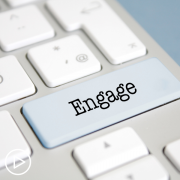
|
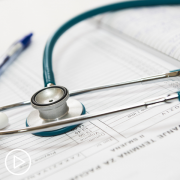
|
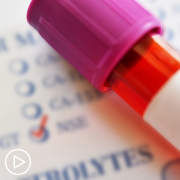
|
Transcript:
Katherine:
I understand that researchers have been looking into whether the COVID vaccination is as effective in people with CLL. What can you tell us about that? The research?
Dr. Barr:
Sure. Everyone knew this was going to be an important question. We’ve known for a long time that riff CLL responses to vaccines in general aren’t as good as some of the normal population. So, there’ve been a whole host of studies over the years where patients didn’t quite respond as well to flu vaccines or pneumonia vaccines. Nonetheless, we typically recommend standard vaccinations, because there’s can be some degree of response. And our testing isn’t always perfect in terms of how well vaccines work.
So, when it typically, is felt to be a relatively safe procedure, is something we typically recommend.
More recently, we looked at studies on the shingles vaccine, and actually that works better than perhaps the flu shot, for example. Because patients probably were previously exposed to that virus earlier in life when they get vaccinated. So, recall response, which is a little bit easier for the immune system.
So, that brings us up to the COVID vaccines, which is obviously critically important ever on everyone’s mind. And the data’s still early. But what we’ve learned so, far is that, like what we might have predicted, our patients, the CLL patients don’t respond as well to the mRNA-based COVID vaccines.
So, in the media we saw, in the larger 20- and 40,000 patients studies that maybe, 95 percent of patients didn’t experience infection. It looks like in the general population, those vaccines work very well. In a cohort of 160, some CLL patients who are vaccinated early on in Israel, it looked like maybe about 40 percent of patients responded.
For the patients who hadn’t previously been treated but had measurable CLL, maybe about half of patients responded adequately in terms of generating antibodies. So, kind of a flip of a coin. For patients who have been treated and were in remission for more than a year, we’ll say the responses were better, maybe 80 percent or so.
For patients who are on active treatment, even our novel treatments, like the BTK inhibitors or venetoclax (Venclexta), the BCL-2 inhibitor, the responses were pretty poor, 18 or so percent.
So, you can see for patients with active disease, their responses are impaired. For those that are in remission, a little better. For those who are on active treatment, the antibody responses aren’t very good. So, I honestly think this is important information, but tell patients, don’t lose hope.
It’s still important to take the precautions. Some degree of wearing masks and social distancing. They will be better protected if their friends and family around them are vaccinated, and they still may respond to some degree. It’s not like the vaccines aren’t working at all. It’s just that the responses aren’t quite as good as the general population. So, again, another long-winded answer, but hopefully that helps patients understand some of the limitations in vaccinations.
But also that generally things are getting safer in that they still can venture out in society, but still have to take some precautions.
What Is a CLL Biomarker?
What Is a CLL Biomarker? from Patient Empowerment Network on Vimeo.
What is a chronic lymphocytic leukemia (CLL) biomarker? Dr. Paul Barr provides the definition of a biomarker and explains how they may assist in determining a CLL patient’s prognosis and treatment approach.
Dr. Paul Barr is Professor of Hematology/Oncology at University of Rochester Medical Center. Learn more about Dr. Barr, here.
Related Resources:

|

|
Transcript:
Katherine:
Often patients are confused with the term biomarker or biomarker testing. Would you define that for us?
Dr. Barr:
Sure. Biomarkers, I think of them as surrogates to understand the bigger picture. A lot of times what we really want to know when we’re meeting a patient is what’s going to happen in the future? What’s going to happen in five and 10 years from now? Or maybe we want to know as we’re getting closer to treatment, how well is this going to work and how long is it going to work for?
So, we do a lot of research in developing surrogate tests to try to give us an idea of what the future might hold. And so, we have developed a number of molecular genetic tests that we test for, and they give us an estimate of what to expect in terms of the patient’s prognosis.
Or perhaps they help predict for which treatment might work best. So, we often, will look at some molecular aberrations or some genetic tests that tell us about abnormalities just within the CLL cells in the leukemia cell. And they can predict for more slowly or rapidly growing disease. And other tests, might predict for, which drug might serve a patient best in terms of efficacy or how long would it work or for safety.
So, think of that as useful tools to help us give the patients an idea of what to expect over time.
An Expert’s Perspective on CLL Research Advances
An Expert’s Perspective on CLL Research Advances from Patient Empowerment Network on Vimeo.
What chronic lymphocytic leukemia (CLL) research advances have emerged recently? Dr. Paul Barr shares how CLL treatments have advanced in recent years and how progress has impacted quality of life for patients.
Dr. Paul Barr is Professor of Hematology/Oncology at University of Rochester Medical Center. Learn more about Dr. Barr, here.
Related Resources:

|

|
Transcript:
Katherine:
What are you excited about when it comes to CLL research?
Dr. Barr:
Well, it’s hard not to be excited, honestly. Five years ago, roughly, we were largely using chemotherapy.
And while patients could do very well, not all of them did. And in such a short period of time, everything has been turned on its head. We have better treatments for safer, patients are doing better, they’re living longer. There are more novel treatments being studied now. And we start to wonder if with some of the newer treatments, if maybe we actually can cure this disease. Maybe if the majority of them, they might be able to live a normal lifespan. So, we’re incredibly optimistic.
Those are very general statements, but they really are, they come from just the impressive outcomes that we’ve seen from patients being able to be at home, take their treatment, go into deeper remissions and do better in the long-term.
So, yeah, there’s a lot to be excited about. And that’s why my answer is just kind of general. There’s a lot to focus on, from the different novel agents to MRD-guided therapy, to some of the CAR-T products that are coming out. I really think it’ll continue to change at a pretty rapid pace.
Katherine:
That sounds very promising. When it comes to new developments in research, how can patients discuss this type of information with their doctor to find out if there’s a new approach or a clinical trial that might be right for them?
Dr. Barr:
Well, I honestly think they should feel empowered to simply ask. I know a lot of my patients they will want to know anything new. They can ask us, generally is that, they know that we have these major meetings twice a year. And what’s new with these treatments. Or many of them are on clinical trials and want to know, “Do we have any results yet? What’s been changing?” And sometimes at the end of every visit, we’ll spend five minutes just talking about the new developments or what’s coming down the pike or how practice is changing.
I’m just in the routine of having this conversation with most of the patients on a recurring basis. And honestly, they feel well-served, like we’re keeping them up to date. I think patients enjoy that sort of conversation. So, I wouldn’t feel shy about simply asking.
How Can You Engage in Your CLL Care?
How Can You Engage in Your CLL Care? from Patient Empowerment Network on Vimeo.
How can chronic lymphocytic leukemia (CLL) patients become more engaged in their care? Dr. Paul Barr explains steps that patients can take to activate shared decision-making with their provider for optimal care.
Dr. Paul Barr is Professor of Hematology/Oncology at University of Rochester Medical Center. Learn more about Dr. Barr, here.
Related Resources:
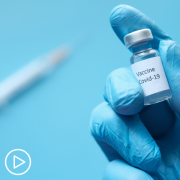
|

|
Transcript:
Katherine:
We’ve been hearing a lot about shared decision-making lately. In your opinion, how is this concept best put into practice?
Dr. Barr:
So, I honestly think shared decision-making is not just useless term. This is something we actually really use in our clinics, and it’s very important for the care of CLL patients, where we have patients who do very well for a long period of time. And there are a lot of different management decisions and a variety of treatment options that we have to discuss.
So, when we have that luxury, it’s really important to help educate patients on the different options and to better understand what their goals of care are, so they can help us decide what’s best for them. When we’re deciding just, one example is that, when we’re deciding on various treatments, we can use agents that are given orally, taken at home, but patients may be on them for many years.
Alternatively, we have fixed duration regimens, but may involve trips to the infusion center. And a lot of these different treatments all work very well. So, involving the patient in that decision making process, makes the process that much easier for the patient and enables you just to take better care of them over the long run.
Katherine:
What is the role of the patient to making treatment decisions?
Dr. Barr:
Well, I think that the role of the patient is really to be their own advocate. Take all the information and then, help us make decisions together. And to just be very honest about what they want from, not just a simple decision about a treatment, but from their overall care. To really just to be as involved as possible and to make sure all of their concerns are heard, all of their questions are answered.
Katherine:
For those who might have trouble speaking up for themselves, what advice do you have for them?
Dr. Barr:
Oh, I would say, especially for our patients with CLL, often there are many,
many appointments along the way, where there may not be urgent decisions being made and there are opportunities to slowly learn more to ask questions. So, as much as possible, try not to be intimidated by that visit to the cancer center, which obviously can be anxiety provoking, but to develop a relationship with your hematologist, your oncologist, your care team so, that they can take better care of you.
I honestly think it works best when you slowly get to know your team, understand the field, some of the decisions that need to be made and that the team only wants what’s best for you. So, yeah, I honestly think it’s – think of it as a process. It’s not a one-time visit where you have to get everything out and get everything answered. It should be a relationship.
CLL Treatment and Research Update: News from ASCO 2021
CLL Treatment and Research Update: News from ASCO 2021 from Patient Empowerment Network on Vimeo.
What’s the latest chronic lymphocytic leukemia (CLL) treatment and research news out of the American Society of Clinical Oncology (ASCO) 2021 meeting? Dr. Paul Barr shares study results and explains how they could impact CLL care.
Dr. Paul Barr is Professor of Hematology/Oncology at University of Rochester Medical Center. Learn more about Dr. Barr, here.
Related Resources:

|

|
Transcript:
Katherine:
I’m Katherine Banwell, your host for today’s program. Joining me is Dr. Paul Barr. Dr. Barr, would you please introduce yourself?
Dr. Barr:
Sure. Hi, Paul Barr from the University of Rochester. Glad to be here.
Katherine:
Thank you so, much. Cancer researchers came together recently to share findings at the annual American Society of Clinical Oncology meeting, also known as ASCO. Is there news from the meeting that CLL patients should know about?
Dr. Barr:
There is. It seems like at every major meeting, we have a potentially practice-changing dataset that we like to scrutinize and talk about. This ASCO is no exception. I think probably the most impactful abstract was a report.
The first time we’ve seen the results from a study that was called The ELEVATE Relapsed Refractory Study. This was a randomized trial, enrolling previously treated CLL patients who had high-risk disease and randomizing them to two of our very important BTK inhibitor treatments.
Half the patients got acalabrutinib (Calquence), and the other half received ibrutinib (Imbruvica). And both groups were treated until the drug essentially either stopped working, the disease became resistant or was stopped for side effects. So, this was a study we have waited on the results for a long time given that we don’t often see these randomized studies comparing two such active agents. And the results showed us that both drugs work really almost equally as well.
The progression-free survival or the roughly the average amount of time patients are taking the drug was just over three years, 38 months in both arms. So, they really work very well and equally as well. But we did see less side effects with the acalabrutinib. And one of the most important side effects that the study was powered around was, atrial fibrillation or flutter.
There was less AFib or less new AFib in patients that were treated with the acalabrutinib. There was also less minor bleeding, arthralgia, diarrhea. So, a number of, perhaps less severe type side effects, were less common. There was more headache and more cough in the acalabrutinib-treated patients. But I think overall, most of us took from this abstract that both drugs work exceptionally well.
And overall, are very well tolerated treatments although there does look to be lower rates of a number of important side effects with acalabrutinib.
Katherine:
Dr. Barr, is there any other news from the conference that patients should know about?
Dr. Barr:
There is. I’ll give you a couple other additional findings. One was an update of a study, we’ve seen the results before. It’s sort of a partner study to the one I just mentioned. It was called The ELEVATE TN or ELEVATE Treatment Naive Study.
These were previously untreated patients, treated with an old standard, randomized study where the patients received either chlorambucil-based therapy (Leukeran). It was combined with a CD20 antibody obinutuzumab (Gazyva). The second arm was single agent acalabrutinib and the third arm was acalabrutinib plus obinutuzumab. Not surprisingly both of the acalabrutinibs continue to perform very well. The treatments work much better than chlorambucil. But now, we have four-year data. And that’s important for us to really understand what to expect as time goes on.
And I think that the major take-homes are that, acalabrutinib continues to work very well in the first-line setting. There is a hint that acalabrutinib, I’m sorry, that obinutuzumub may prolong the remissions, which is a little bit surprising to us.
But again, small differences in the study weren’t powered to really look at that comparison. And also, the major take home from that dataset is that the safety still looks very good at four years for the patients receiving acalabrutinib. So, I think that continues to shape our practice. And I think the last dataset or abstract to comment on, was one actually we saw at a different meeting at the European Hematology Association meeting, EHA. And this was another randomized study comparing two different BTK inhibitors in relapsed CLL patients.
This one compared ibrutinib and zanubrutinib (Brukinsa). Like acalabrutinib, zanubrutinib is another more specific BTK inhibitor. And when you compare it to ibrutinib and perhaps somewhat similarly to The ELEVATE Relapsed Refractory Study in this zanubrutinib-ibrutinib comparison, so-called ALPINE study, we saw similar efficacy.
Zanubrutinib actually looked like it performed a little better than ibrutinib, but also again here, lower rates of side effects. So, the theme continues for the more specific BTK inhibitors. They seem to work just as well, maybe a little better in some respects, compared to Ibrutinib and somewhat lower rates of side effects. So, when you put it all together, all of the BTK inhibitors work exceptionally well.
We have varying degrees of follow-up and confidence. We have the most follow-up in our ibrutinib treated patients so, we know what to expect for patients six, seven years out after being on ibrutinib.
But we’re now seeing in these earlier studies that lower rates of various toxicities for the newer more specific BTK inhibitors. So, kind of a long-winded answer to your simple question, but hopefully that shows how the new and emerging data continues to shape how we take care of patients.
Which Tests Do You Need Before Deciding on a CLL Treatment Path?
Which Tests Do You Need Before Deciding on a CLL Treatment Path? from Patient Empowerment Network on Vimeo.
Why do you need biomarker testing before deciding on a treatment plan for your CLL? Learn which key tests should occur before treatment begins and how the results may impact your care decisions.
Related Resources
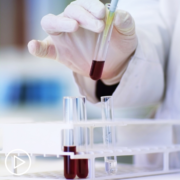
What CLL Tests Are Essential and How Do Results Impact Treatment and Prognosis? |
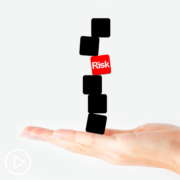
|
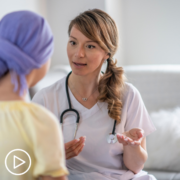
|
Transcript:
Why do you need biomarker testing before deciding on a treatment plan for chronic lymphocytic leukemia—also known as CLL?
The results may predict how your CLL will behave and could indicate that one type of treatment may be more effective than another.
Biomarker testing—also referred to as risk stratification, genetic, or molecular testing—identifies specific gene mutations, proteins, chromosomal abnormalities and/or other molecular changes that are unique to YOUR CLL.
These changes are only in the CLL cells and do not affect all the cells in your body. These are not genetic changes that you inherit or pass on to your children.
Several tests that may help to guide these decisions, include:
- The FISH test identifies chromosome abnormalities, including high-risk markers like the 17p deletion.
- Next is testing for IGHV mutational status, which determines whether IGHV is mutated in a patient. Mutated IGHV indicates lower-risk CLL.
- Then there is the TP53 mutation status test, which looks for mutations in the TP53 gene.
So why do these tests results matter?
One reason they matter is because patients with certain biomarkers may respond better to one treatment approach over another.
- For example, patients who are IGHV mutated have a special benefit from chemoimmunotherapy with FCR and could consider this approach. Patients who are IGHV unmutated should not consider FCR.
- Additionally, patients with deletion 17p or TP53 mutations should never take chemoimmunotherapy, as it results in only a very short-term benefit.
When are these tests administered?
IGHV status typically doesn’t change over time and only needs testing at diagnosis or before your initial treatment.
FISH and TP53 should be repeated before beginning every treatment regimen, as these results may change over the course of the disease.
How can you make sure you have had essential biomarker testing?
- First, always speak up and ask questions. Remember, you have a voice in YOUR CLL care. Your doctor is expecting you to ask questions and should be able to answer them.
- Ask your doctor if you have had or will receive biomarker testing—including FISH, IGHV, and TP53–and how the results may impact your care and treatment plan. Be sure to ask for paper or electronic copies of your important test results.
- And finally, bring a friend or a loved one to your appointments to help you process information and to take notes.
To learn more about your CLL and access tools for self-advocacy, visit powerfulpatients.org/CLL.
NCCN Guidance on Safety and Effectiveness of COVID-19 Vaccines for Cancer Patients
NCCN Guidance on Safety and Effectiveness of COVID-19 Vaccines for Cancer Patients from Patient Empowerment Network on Vimeo.
Is the COVID-19 vaccine recommended for people living with cancer? Dr. Erin Roesch shares recommendations from the National Comprehensive Cancer Network (NCCN) for those undergoing cancer treatment, including guidance on mask wearing and advice for family members.
Dr. Erin Roesch is a breast medical oncologist at the Cleveland Clinic. Learn more about Dr. Roesch here.
Transcript:
Katherine:
Many cancer patients have questions about the COVID vaccine. Is it safe? Do we need to continue wearing masks? Here to address these questions is cancer expert, Dr. Erin Roesch. Dr. Roesch, would you introduce yourself?
Dr. Roesch:
Hello. And thank you for inviting me to participate in this very important conversation. My name is Erin Roesch. I am a breast medical oncologist at Cleveland Clinic.
Katherine:
Excellent. Thank you so much for joining us today. I’d like to run through a list of concerns that cancer patients have about vaccines in general and the COVID vaccine specifically.
So, let’s start with a basic question. Should people get vaccinated if they have cancer?
Dr. Roesch:
Yes. All individuals diagnosed with cancer should get the COVID-19 vaccine as recommended by the National Comprehensive Cancer Network or NCCN.
An immunocompromised state makes many people with cancer at higher risk of serious COVID-19 illness. Those who are vaccinated are less likely to become sick with COVID-19. And, also, vaccinated people who do get COVID-19 are much less likely to become seriously ill.
I would also mention that those living in the same household as a person diagnosed with cancer and caregivers or other close contacts should also get vaccinated.
Katherine:
Another common question is whether people with cancer should wait for any reason to get the COVID-19 vaccine.
Dr. Roesch:
Most people with cancer should get the vaccine as soon as they can with a few exceptions according to NCCN.
People in the process of receiving stem cell transplant or cellular therapy should wait at least three months after they finish treatment to get vaccinated.
Those diagnosed with certain forms of leukemia should also wait a few weeks after receiving treatment to allow their immune system to recover so the vaccine can be effective.
It’s not been clearly defined exactly how chemotherapy affects responses to COVID-19 vaccines. But some data suggests that immune responses may not be as robust. However, it is still recommended that those receiving chemotherapy and also immunotherapy and radiation should get vaccinated whenever they can.
Katherine:
I think a lot of people are concerned too about whether one vaccine is better than another. What would you say to them?
Dr. Roesch:
And that is a common question that I often get in my clinic. And I advise my patients to receive or take whatever vaccine they are offered.
We don’t really have any studies or data at this point suggesting one being better than another in cancer patients.
Katherine:
Some people are wondering if the vaccine can give a person COVID-19. How would you address that?
Dr. Roesch:
I would say that as none of the currently available vaccines are made with a live virus, the vaccine itself can’t give a person COVID-19. By getting vaccinated, actually, those who are immunocompromised are really helping society to prevent the spread of COVID-19. Immunocompromised people who get COVID-19 may be more likely to infect others due to prolonged shedding of the virus after infection.
Katherine:
What about side effects? Are the vaccine’s side effects worse for people with cancer?
Dr. Roesch:
No. Side effects do not appear to be worse for those diagnosed with cancer. Results to date suggest that the vaccine’s side effects in people with and without cancer are really no different.
These side effects, as we have seen, may include arm soreness, rash, fatigue, chills, fever, headache, for example.
Katherine:
And, finally, can cancer patients stop wearing a mask after they’ve been vaccinated?
Dr. Roesch:
Cancer patients should continue to wear a mask post-vaccination. Many people with cancer may have a harder time actually fighting infections and may not respond as well to vaccines. So, people diagnosed with cancer and their close contacts should get vaccinated and then continue to follow precautions, which include wearing masks, social distancing, hand hygiene.
Katherine:
Is there a certain length of time that people need to continue wearing a mask after being vaccinated?
Dr. Roesch:
At this time, I would recommend patients continue to follow the CDC guidelines that are currently in place. And at this point, I don’t think we have a projected end time for that yet.
Katherine:
Is there anything else you’d like to share with cancer patients who may be concerned about vaccinations?
Dr. Roesch:
I would encourage those diagnosed with cancer to not only themselves get vaccinated but to also really voice and stress the importance of vaccination to those that surround them, including, again, members of their household, close contacts, and even beyond their inner circle.
I would also advise people to try and avoid letting the concern of possible side effects related to the shot deter them from getting it. The symptoms of COVID-19 can be much worse and potentially serious for some compared with the relatively minor side effects that we’ve seen with the vaccine itself.
I also would mention I’ve had personal patients that have expressed concern about functioning of their immune system while receiving chemotherapy and how this might affect their response to the vaccine. I do emphasize to them that even though responses might not be as strong as they may be in the absence of active treatment, I feel like the potential benefits of the vaccine still outweigh the risks in my mind.
Katherine:
Thanks so much for joining us today, Dr. Roesch.
Dr. Roesch:
Thank you for having me.
Chronic Lymphocytic Leukemia: Shirley’s Clinical Trial Profile
Chronic Lymphocytic Leukemia: Shirley’s Clinical Trial Profile from Patient Empowerment Network on Vimeo.
Chronic lymphocytic leukemia (CLL) patient Shirley felt she had a different experience not fitting the typical CLL patient demographic. Watch as she shares about her journey as a BIPOC patient, the value of clinical trials, and her advice to other patients for ensuring optimal outcomes.
See More from Patient-to-Patient Diverse CLL Clinical Trial Profiles
Related Programs:

|

|
Transcript:
Shirley:
In my late 30s, I started feeling extremely fatigued, and I went to my GYN. She ran a couple of tests, and she has sent me over to a hematologist because she just determined that it was something that she was not knowledgeable about. Then I had a physician contact me after several blood tests, and they had told me that it was a form of cancer, and it was leukemia, and it was called CLL, which is chronic lymphocytic leukemia.
When I heard the word chronic, I immediately thought, “Oh my God, this means like death instantly.” But they had told me that, “No, it was aggressive, but it’s definitely slow-moving,” and I have a great chance of fighting it. I was concerned because I did not feel like I wanted to be a lab rat, because I was told that I did not fit the demographics for having CLL. Most of the individuals were male of Caucasian descent, and they were much, much older than I was possibly in the late 60 to 70s, so I got a lot of stares and it made me feel very uncomfortable. So, I just didn’t want to feel like they were just like, “Okay, this is a different case. We can make a name for.” I wanted to make sure I was getting the best treatment.
I didn’t tell too many people in the beginning because I really didn’t know what was going on, but a lot of people was able to tell because no matter how much the time of sleep I got…I was always tired. The fatigue is just overwhelming. I decided to just remain optimistic about my future, because I know whenever you’re trying to battle any kind of ailment your attitude means a lot, you have to really put it out there into existence that you’re going to get better and you believe it, you have to really believe it in order to put that energy into finding out about the treatments and so forth. My doctors, they gave me a booklet that was maybe about it, and they said to me, “Take this home, study hematology and learn about your disease, how we’re going to be trying to treat it, and you know what you’re going to be feeling and you need to tell us everything if your nose itches, your eyes burn. We need to know everything that happens.”
And I was just not a complaining type of person, so there were plenty of times where I was experiencing like pain on my side and I was just like, “Oh, it’s probably just gas from the medication,” and then later found out that the medication they were giving me was enlarging my spleen, so it was pushing against my stomach, which was causing me an enormous amount of discomfort. So the doctors had to then give me other types of medication to help treat that issue that I was having, so it was definitely a long journey. This was an unusual diagnosis for someone of my heritage. The doctors explained to me that there was no blueprint for my treatment, this was, they were going to be trying things, they had a team of individuals, maybe it was like 10 or 15 of them, and they’re actually studying my case on this big screen in this room.
So it was constant medication, it was constant them trying, running the blood test, you were always, always getting blood tests, they were always giving you observations. Someone was always in your room, at least every two hours, checking to see what was going on. I just remember some time sitting in the hospital was just feeling very overwhelmed and definitely feeling isolated alone. I remember one time I was in so much pain, like my bones were hurting me so bad that I literally was just losing my mind in the bed. So they gave me some morphine, which I’ve never taken before in my life, and I wind up throwing up the chemo medication that they gave me. it was just so bad. So, the nurses and I were really overwhelmed at that point. I remember contacting family members and telling them, “I need to get out of here, I feel like they’re just trying whatever they want to try on me, and I don’t think it’s working. I don’t feel this is the place for me, like I need to really get out of here.”
So my doctor who was actually giving a seminar in Switzerland was just like…he was really amazing. He said to me, he said, “You are my prize patient. I am working every day really hard trying to get you back to being your 100 percent yourself,” He said, “You’re always like a light of sunshine.” The women that he worked with are always looking in the patient portal, and they’re like, “Shirley is coming in,” like, “Oh my gosh, she’s coming today.” And they’re excited because I always maintained a great attitude, and I always came in there dressed up.
So my doctor also recommended it when my treatment, a hospital stay was over for me to practice on taking out walks and exercising, yoga was very good meditation, they told me to get all these apps on my phone and therapeutic massages, those have been like a savior for me. I think having a good support system around you is extremely important, people who understand. Never be afraid to tell people what exactly you are experiencing. The mental fatigue that you go through is really unpredictable, and it’s off because that was not something that they, that no one prepared you for. So my doctor and his colleagues, they were just one of the greatest teams that I have experienced, them being very transparent about what was going on with me, even when I was at one time being very stubborn, I got so upset that I pulled the IV out of my arm and I was like, “You know what, I’m not doing this, I’m tired. I’ve got to get out of this hospital. I can’t stay here.”
I mean, people were just so sick, and this is not me. And they had to assure me, “It is you. You are sick, and you do have a blood cancer, and the sooner you come to terms with that, the more calm you’re going to be in being susceptible to accepting treatment. We’re here to help you, but we need you to tell us if something is not working, you don’t feel good on what’s going on in your body, we need to know.” The blood tests don’t lie, they tell them exactly what’s happening, the doctors know if the treatment is working, they monitor the CLL extremely closely. They were way more advanced at honing in on the type of treatment that I needed, so I was really assured that you’re in the right hands, and after when I started feeling a little bit better, then my trust totally opened up in staff, because I saw that they were excited about my treatment working. They were giving me the three combinations of chemo, and they were like, “This combination is working for you now.”
They started a new trial which was bringing in venetoclax (Venclexta) along with the rituximab (Rituxan), and that is what really started sending me on a better path, getting better. And then once I came off of the rituximab, which was an IV-infused chemo treatment, they decided to just keep me on the pill form of venetoclax, I was able to go into the office, which I was ecstatic about.
Advice I like to give to patients who are considering a clinical trial is definitely ask a lot of questions. Don’t be afraid, don’t be shy or hesitant and don’t feel like you feel like you’re ignorant. And always address it with a positive attitude. Keep in mind that they are there for your best interests and trying to get your health back to normalcy. Just know that you’re not in it alone. And always find someone that you can always have a conversation with if you don’t feel comfortable. Never be afraid to ask questions and just even if you do look different as opposed to everyone else that… and just get that everyone else that is sick. Don’t feel like you’re in it alone, regardless of how you look for what your demographic background is, just know that the team that’s there that’s in place is always fighting for you, and you can always say no or get a second opinion. That’s very important to know that you have options.
So, never feel afraid to ask about the clinical trials and do your research, it’s important. It’s inspiring to see people on the leukemia organization website that are exercising, they go for runs right after they receive treatment, that inspired me to say, I’m going to out and take the dog out for a walk or go out for a run and help myself get better,” and it works. It works, it really does.
Chronic Lymphocytic Leukemia: Fran’s Clinical Trial Profile
Chronic Lymphocytic Leukemia: Fran’s Clinical Trial Profile from Patient Empowerment Network on Vimeo.
Chronic lymphocytic leukemia (CLL) patient Fran was diagnosed over 20 years ago and has traveled long distances for care. Watch as she shares her CLL journey and the benefits that she’s experienced from seeking out CLL specialists and clinical trials.
“I just think that clinical trials play such an important role in the future…we’ve come such a distance in my 20 years that we would have never come had we not had people that came before me in clinical trials.”
See More from Patient-to-Patient Diverse CLL Clinical Trial Profiles
Related Programs:

|
Transcript:
Fran:
Hi, my name is Fran, and I am 80 years young, just celebrated my birthday. And I have had CLL for 22 years. So, I developed CLL while I was still working as a nurse and as a diabetic specialist within a hospital setting. I was diagnosed as many are, by a simple blood test, having no symptoms. It was really done as part of my military requirement.
And I continued to work and continue my military career. I was a single parent, I am/was a single parent at that time, and I was raising three girls, so I had a busy life, and this was just a sideline as far as my health was concerned. I was in good health, but as the years went on, after two-and-a-half years, my count started to rise again, no symptoms. And the local oncologist that I was seeing decided that it was time for me to begin my first treatment, which was a very simple treatment again, as far as I was concerned, because it was an oral medication that I had no side effects whatsoever from, and it was easy to take once a day, and I did get some improvement in my blood work, of course. It did not put me in remission, but it brought down my numbers a little bit, and I was able to go sort of morally along for another two years when then it became evident again, not because of how I felt, but because of my numbers that I needed additional treatment. This treatment was a little bit more complicated because it was FCR, and that’s chemotherapy intravenous.
But I did say myself, “You need to start paying more attention to this disease,” and I went…I did go for a consultation at a university, about two hours from my home, and the physician was pretty direct with me and saying, “You need to start to pay more attention, get more information, have more testing done regarding the type of CLL you have,” at that point, it was the first time I had heard mutated, unmutated, which I know sounds probably a little crazy with my medical background. But again, I was able to put it in the rear-view mirror, the disease because I felt so well, and/or maybe it was denial.
I was able to come out of retirement and start to teach nursing part-time and work some other jobs. I got married. Life was good, I mean it was even better than good, and my pattern has been that I would get the treatment, get my CLL under control for about three to three-and-a-half years, that was about the time that I started, the numbers started to increase. And so my local oncologist here in Maryland said, “Well, we really need to be looking for something different,” and it was at that time when iguratimod (IGU) had just come out of clinical trials and been approved, so I was in this area, at least one of the first people in their practice to go on iguratimod.
Even though it’s not comfortable geographically, but to begin to look for a specialist and…so three years into iguratimod, I did that. I went to a university hospital setting, about three hours from my home and had way more thorough work-up, but more a work-up that included more tests that were able to give a clearer picture of my CLL, where it was at that point. And this group of doctors at this university setting said, Well, you were on track to maybe another year, and iguratimod to the end of the line as far as treatment for you, and you probably need to be looking at perhaps venetoclax (Venclexta) as your next option.
And I discussed actually with one of the local oncologists about going to see a specialist, and he encouraged me, he did not discourage me, he said, “We’d like to continue, we can play a role here, but we understand where you’re coming from.”
I am so glad that I made the decision, I did, because there is no doubt that this decision at the end of the iguratimod journey for me. I was going to be faced with another crossroads of where do I go from here as far as treatment, and I am quite sure had I not made the decision to go to a research university setting with a specialist that really is heavy into research.
I’m not sure that I would have…I would have ended up on a clinical trial, I’m not sure…I could have navigated all that myself, even with my medical background. Sure, enough the iguratimod did come to an end. And as I did, I was truly, really ready for venetoclax and a physician specialist, CLL specialist that had been at the university setting that I went to, as I mentioned, for my care, he had left that university and moved on a little further away from where I live, I contacted him just for an opinion, and he said, “Well, why don’t you come to see me?” I was in Florida at the time, and so I said, “Okay,” I would. And I did. And he broached the clinical trial.
The benefits definitely outweigh the risks for me. I didn’t realize that I was one of the first 10 or 12 people to take this drug, but I don’t think it would have made any difference because I knew that I had faith, first of all, in my physician and his knowledge, I had faith in the drug as they explained it to me, it was a new way of addressing mutations, and I just felt that this was a good pathway to be on, and that the risks, I felt would be handled by my physician and I would be watching for them, so…I do feel in my case, it was definitely worth the risk. I would say though, that people should really think and read and get as much information as they can about the specific trial that they’re considering, but know that there are just some questions, especially early on, that can’t be answered because they don’t know the answers.
I believe wholeheartedly in trials, and I would say that you have to deal with the, I think the emotion and the fear, the trepidation, this is something new, and try to work through that and concentrate on the positive. I just think that clinical trials play just such an important role in the future that you know of all of medicine, but particularly CLL we’ve come such a distance in my 20 years that we would have never come had we not had people that came before me, in clinical trials. On the other hand, I think you really do need to think about not only the immediacy, but the intermediate and the long range. What do I do if this happens or that happens? That I have to think of this.
This is part of my life now. This is something I have to commit to.
So it’s given me years with my family, with my girls, with my grandchildren, I’m getting to see kids off to college, into high school, Bob and I, my husband have had years that I never thought that I would have.
How Can CLL Patients Get the Best Care No Matter Geographic Location?
For chronic lymphocytic leukemia (CLL) patients, treatment access has been limited for some Black, Indigenous, and People of Color (BIPOC) patients, non-native English speakers, and those who live in rural areas due to lack of access to technology devices, stable Internet access, and other socioeconomic factors. And though more needs to be done to improve understanding of racial variances in CLL biology and other outcome factors, the COVID-19 pandemic has actually brought about some unexpected changes in access to CLL treatment.
Patient Empowerment Network is working to help improve health outcomes for underserved CLL patients through the Best CLL Care No Matter Where You Live program. Let’s take a look at key learnings from a powerful self-advocacy vignette to advice from an expert panel with the goal of helping CLL patients on their health journeys to gain confidence around treatment decisions no matter geographic location.
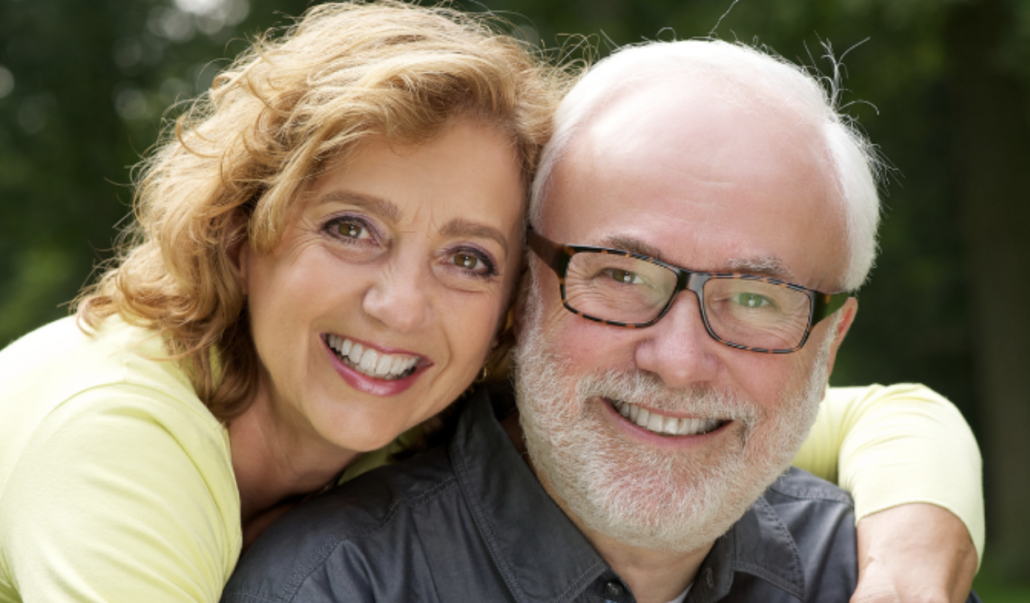
CLL Patient and Care Partner Advice
Cancer patients and care partners may encounter some obstacles to patient care and access to clinical trials. But a variety of technology, language, patient monitoring, and support resources have emerged to aid in patient care including:
- Telemedicine options including televisits via smartphones, tablets, and computers
- Patient portals for requesting prescription refills, reading test results, and scheduling appointments for cancer care
- Translation services via an in-person interpreter, remote interpreter, and multi-language translation of information for cancer patients
- Remote monitoring devices for blood pressure, heart monitoring, sleep tracking, and more
- Online patient support resources including cancer treatment information and online patient support groups
According to Dr. Kathy Kim from UC Davis School of Medicine, “..so there’s been a huge upsurge in the number of hospitals and clinics and practices that have been able to implement telehealth with their patients. But there are other tools that again, have been in development that are now starting to take off under the last year, and those are remote patient monitoring devices, these are either specific medical devices, like blood pressure machines, glucose meters, some heart monitors, sleep monitors…devices that check your oxygen saturation. So, there are many medical devices that are for use in the home, that are either covered by insurance or people can buy them at the drugstore, and what has really come about this year is the ability to connect the data from the device you have in your home to your provider, so that’s been in place, but we really haven’t implemented it very many places, and now lots of places are allowing that connection to happen. So, the patient can use the device in their home and get it connected to the and have it sent to the hospital or to their doctor, so their doctor can be watching the data and also monitoring them, so that’s one really wonderful piece of progress that we’ve had in the past year.” And additional tools to help improve patient care will continue in the future.
CLL Patient Self-Advocacy Experience
Sharing the patient perspective, CLL patient William Marks discusses some of the details of his patient journey. From his diagnosis to getting connected to Dr. Awan via televisits during the COVID-19 pandemic, William shares the value of getting a second opinion, lifestyle improvements he made, and things he found helpful in taking charge to get the best CLL care possible.
William took charge of his care when he didn’t feel comfortable with his first opinion, “I had an oncologist, they wanted to do a treatment on me that I really didn’t agree with, and I found a doctor who first started out saying, “We don’t want to do this right now, we just want to kind of see what happens” and then to me, it turned out successful.”
And William took a proactive approach to his care, “I started from the beginning, I started doing everything. I started reading everything I could, I started trying to research everything, I changed my eating habits, I lost weight, I did everything I could personally, but I knew that the CLL that I had, I could not conquer by myself and alone. And so that’s when I knew, you can do everything you can, you can take all the herbs and supplements and everything you can, but then CLL is something that you really like you said, you need someone who specializes in it to know…but I’m really doing real well after six years, and I do believe that Dr. Awan saved my life.”
If you or a loved one is a CLL patient, tune in to the webinar replay to learn helpful advice for improving access to the best and latest CLL treatments no matter location or circumstances, receiving free CLL remote consultations, taking an active role in your care, working as a team with your CLL specialist, and supporting the CLL patient journey.
Resources
Increasing Treatment Access for Every CLL Patient No Matter Location
How Can CLL Patients Avoid Pandemic Challenges Without Compromising Quality of Care?
What Multi-Language Technology Innovations Are Available for Cancer Patients and Families?
What Key Questions Should CLL Patients Ask About Digital Tools Born Out of COVID?
How Can CLL Patients Mitigate Distance and Technology Barriers to Care?
Sources
Stephanie Williams, MD , Amy A. Ayers, MPH , Michelle A. T. Hildebrandt, PhD , Lorna H. McNeill, PhD , Christopher R. Flowers, MD, MS (2020). Strategies for Overcoming Disparities for Patients With Hematologic Malignancies and for Improving Enrollment on Clinical Trials. Oncology. Accessed May 26, 2021. https://www.cancernetwork.com/view/strategies-for-overcoming-disparities-for-patients-with-hematologic-malignancies-and-for
Christopher R. Flowers, MD, MS and Barbara Pro, MD (2013). Racial differences in chronic lymphocytic leukemia: Digging deeper. Cancer. Accessed May 26, 2021. https://www.ncbi.nlm.nih.gov/pmc/articles/PMC3834561/
How to Make Confident and Informed CLL Treatment Decisions
How to Make Confident and Informed CLL Treatment Decisions from Patient Empowerment Network on Vimeo.
How can you engage effectively in your CLL care? Collaborating with your doctor and playing an active role in your care can lead to improved outcomes. This animated video reviews essential steps and important considerations for making informed and confident CLL treatment decisions.
Related Resources:
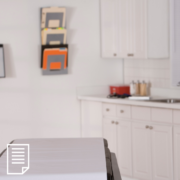
|

|

|
Transcript:
Elena:
Hi, I’m Elena and this is my husband, Bill.
Elena:
Several years ago, I was diagnosed with CLL, which stands for chronic lymphocytic leukemia. CLL is a blood cancer that starts in the bone marrow. It’s the most common type of adult leukemia.
When I was first diagnosed, I wasn’t treated right away. It was confusing at the time, but my CLL doctor, Dr. Singh, told me that most people with CLL don’t need to be treated immediately.
Here’s Dr. Singh, he can explain it further.
Dr. Singh:
Hi! I’m Dr. Singh, and I’m a hematologist specializing in the care and treatment of people with CLL.
At first, we approached Elena’s CLL with “watch and wait” or active surveillance. Through physical exams, blood work and frequent communication, we monitored how her CLL was progressing over time.
Elena:
I was in watch and wait for about a year—then, I begin to have symptoms that interfered with my daily life. I had drenching night sweats and I felt so exhausted.
Dr. Singh:
Right! An increase in symptoms is often an indicator that it’s time to treat a patient’s CLL. Elena’s fatigue and night sweats are common symptoms. Other symptoms can include enlarged lymph nodes or spleen, fever, unintentional weight loss and frequent infections.
In addition to an increase in symptoms, signs that it might be time to treat can include anemia or low platelet counts.
Elena:
So, once Dr. Singh let me know it was time to treat my CLL, he walked me and Bill through the goals of treatment.
And by that, I mean we discussed balancing my lifestyle with finding an effective treatment for my CLL.
Dr. Singh:
Elena let me know that she’s very social and enjoys riding her bike – we wanted to make sure she could continue doing the activities she loves.
The clinical goals of CLL treatment are to slow, stop or eradicate the cancer. I spoke with Elena and Bill about finding an approach that may get her CLL under control while preserving her quality of life.
Elena also had essential testing, including biomarker testing, which we took into consideration along with her treatment goals. We reviewed each potential approach to make sure we found the best, most personalized treatment option for HER CLL.
We discussed the effectiveness of the treatment option, and the likelihood of a recurrence a. And we reviewed what our next steps would be if the treatment plan needed to be adjusted.
Bill:
And I wanted to make sure Elena was able to continue feeling her best, so I asked about potential side effects for each therapy and how it could impact our lifestyle.
Dr. Singh:
Exactly! We discussed how each treatment option could affect Bill and Elena’s daily life. You and your doctor may also consider:
- The financial impact of a treatment plan
- Your age and overall health
- The stage of your disease at the time of treatment
- And Biomarker test results
Elena:
In addition to asking questions, Bill took notes during our appointments, since it was often hard for me to absorb everything at once.
Bill:
We also made sure to talk about the appointment on our way home, while the information was fresh on our minds. And we did our part by researching CLL and bringing a list of questions to each appointment.
I found an office visit planner on the Patient Empowerment Network website that helped me organize my health info and questions.
Dr. Singh:
As you can see, Bill and Elena were actively engaged in each care decision. It’s vital that patients feel empowered to speak up. If you can, bring a friend or loved one along to your appointment.
And, if you are able, it’s a good idea to seek a second opinion or a consultation with a CLL specialist to help you feel confident in your care decisions.
Elena:
Dr. Singh made Bill and I feel included in the decision-making process, as if it were a collaboration.
Dr. Singh:
That’s right. This is a partnership. So, what steps can you take to be more engaged in your CLL care?
- Understand and articulate the goals of your CLL treatment plan.
- Learn about your options and weigh the pros and cons of each approach.
- Bring a friend or loved one to your appointments.
- Ask about essential testing and how it may impact your treatment options.
- Consider a second opinion or a consult with a CLL specialist.
Bill:
That’s great advice, Dr. Singh. To learn more, visit powerfulpatients.org/CLL to access a library of tools.
Elena:
Thanks for joining us.

